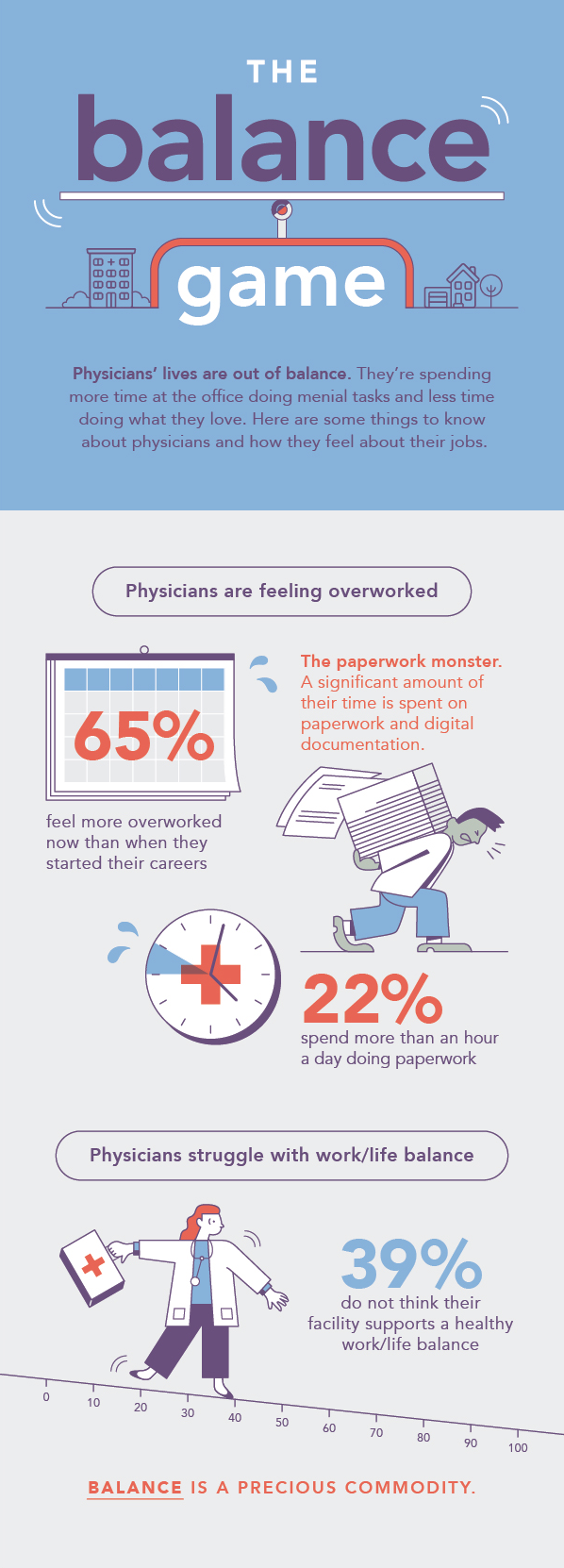Physician Workload and Communication Survey Shows Physicians are Overworked and Want More Time with Patients
Physicians’ lives are out of balance, according to a recent study by locumstory.com.

To better understand how physicians feel about their jobs, including their workload and communication with patients, locumstory.com surveyed nearly 1,000 physicians across multiple specialties and practice types, including private practice, hospital-based practice, group practice and others (health maintenance organization [HMO], locum tenens, etc.).
The survey found that due to the growing amount of paperwork, physicians are spending more time at work, but less time with patients. In addition to working longer hours, physicians are also taking secondary jobs to supplement their incomes.
Here are the key findings from the survey.
Physicians feel overworked
According to the survey, nearly two-thirds of physicians (65 percent) feel more overworked now compared to when they first started their careers. In contrast, only 13 percent say they are less overworked now than at the beginning of their careers. Overexertion is felt strongly across practice types.
Physicians have poor work/life balance
Many physicians feel their jobs don’t afford them well-balanced lives. Thirty-nine percent of physicians do not think their facility supports a healthy work/life balance. The results are consistent across all practice types, including private practice (35 percent), hospital-based (41 percent), and group practice (39 percent).
Free time is declining
This lack of balance comes in part from physicians feeling like they have less free time outside of work. According to the survey, 64 percent of physicians think they have less free time now than when they began their careers. They are also spending more time doing paperwork and entering information into electronic health records, with 22 percent spending more than an hour each day on paperwork alone.
Not satisfied with time communicating with patients
More than half of doctors (58 percent) report spending less time with patients now than they did when they started their career.
Fifty-nine percent want more time to communicate with patients and they prefer that communication happen in person. Sixty-two percent do not want to text with their patients and 53 percent believe digital communications distracts from patient care.
If physicians cannot meet with patients in person, they prefer phone (47 percent) and patient portal email (37 percent). Only 5 percent were interested in texting or using personal email accounts to communicate with patients.
Many healthcare facilities (53 percent) now give patients the ability to connect with physicians via patient portal email (86 percent), phone (67 percent), personal email (19 percent), and text message (18 percent).
More Physicians are Considering Leaving Medicine
More than half of physicians (55 percent) indicated they had considered quitting or leaving the medical field in the past few years. Of those who have thought about quitting medicine, the majority indicated it was due to spending too much time entering data into electronic health records (68 percent), being overworked (62 percent), and spending too much time on paperwork (59 percent).
Physicians Taking Secondary Jobs
More than one-third of responding physicians (41 percent) have taken additional jobs to supplement their income in the last few years. Respondents named three major reasons for working a second job: A decrease in their primary income (49 percent), wanting to support their preferred lifestyle (35 percent), and paying off debt (31 percent). Physicians in private practice are the most likely to take a second job because of reduced income in their primary job than any other practice type (45 percent).
Many Physicians Choose Locum Tenens as Supplemental Income
Locum tenens positions are the most popular way physicians make additional money. According to the survey, 21 percent of respondents who reported taking a second job chose locum tenens assignments to supplement their income, followed by moonlighting (15 percent), and consulting (13 percent).
More than 40,000 physicians work locum tenens assignments each year across all 50 states, and 90 percent of U.S. healthcare facilities use locum tenens physicians.*
Methodology
An email survey polled 993 doctors across the United States to determine physician attitudes about their
workload, and how their workload affects their overall well-being and their opinion of the medical
profession. The survey was conducted in
December 2015 by Hanover Research on behalf of
locumstory.com.
*Source: 2015 Survey of Temporary Physician Staffing Trends
